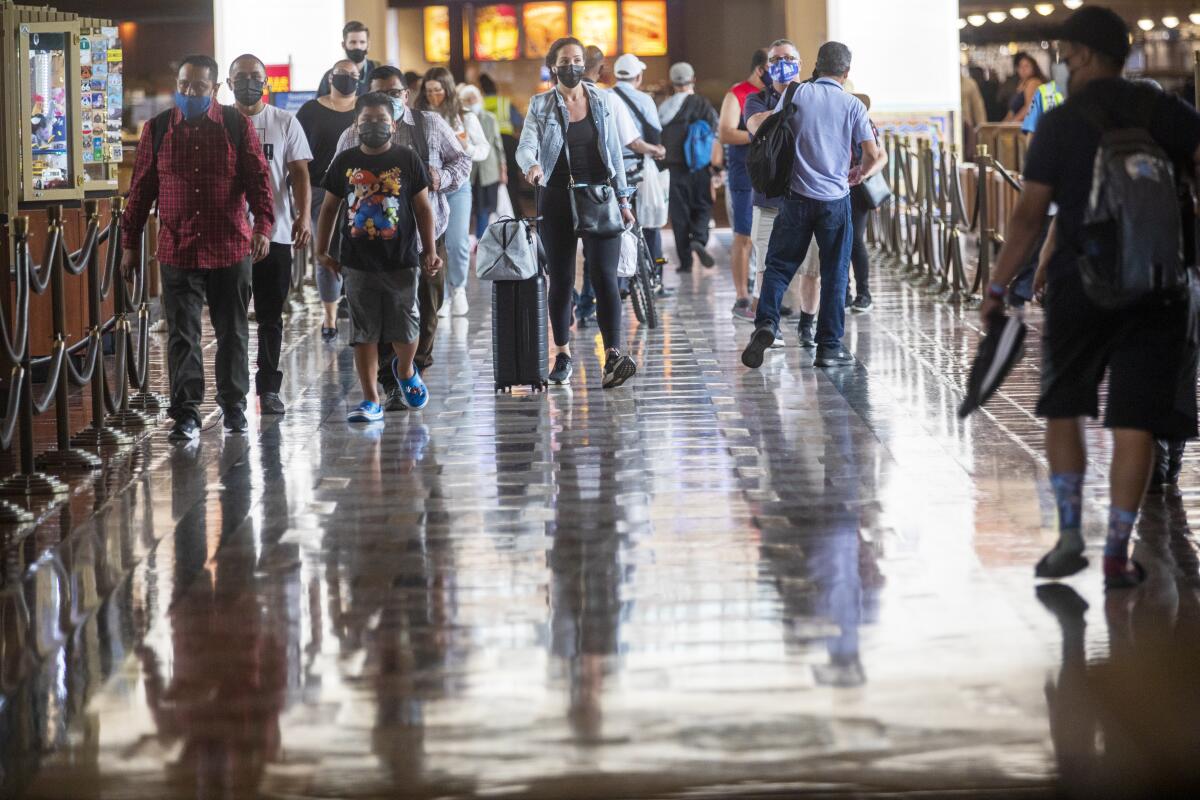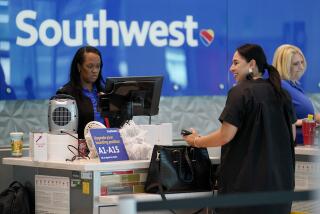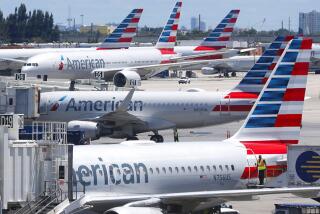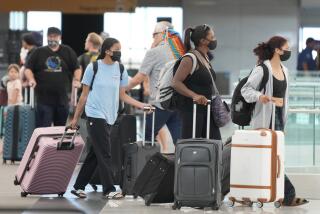U.S. economy appears to be softening due to Delta variant

- Share via
The Delta variant of the coronavirus has muted the progress of the U.S. economic recovery from the COVID-19 pandemic, with consumers putting off some leisure spending and businesses delaying a return to normal operations, according to a number of reports that show softness in August.
Here’s how the latest outbreak is tempering the pace of recovery:
Airlines
The number of travelers moving through airport checkpoints has started to drop again.
On Tuesday, 1.47 million travelers took flights, the fewest in more than three months, according to Transportation Security Administration data. The seven-day average has declined to around 1.76 million passengers a day in late August from around 2.05 million a month earlier.
Although this partly reflects the end of the summer vacation season, airlines have also cited the Delta variant.
There’s been a “deceleration in leisure booking and an increase in cancellations,” said Helane Becker, senior research analyst at Cowen Inc. As companies have delayed a return to offices, the return of business air travel is also probably delayed, she said.
Happy Masks’ face coverings for kids are a back-to-school sensation amid heightened COVID-19 anxiety — but good luck buying one.
Restaurant dining
Seated dining at U.S. restaurants has been running at about 10% to 11% below 2019 levels in recent weeks, after narrowing the gap to just 5% to 6% below in late July, according to OpenTable, which processes reservations online. Concern about the Delta variant and city mandates are playing a role, according to the company.
“We see a pronounced decline in late July and August,” said Debby Soo, chief executive of OpenTable. “While several factors could be at play here, we believe the primary driver of the downturn is diners’ concerns about the rise in COVID cases.”
Hotel occupancy
Although leisure travel helped to boost some popular destinations over the summer, hotel occupancy has now declined for four consecutive weeks, according to STR, a lodging data tracker. Average room rates have declined for three weeks.
Among 25 large U.S. markets, none saw increased occupancy in the week that ended Aug. 21 compared with the same week of 2019, STR found. Occupancy dropped by more than 40% in San Francisco, the most of any market.
“Demand looks like it is running slightly worse than the typical seasonal decline,” said Bill Crow, an analyst at Raymond James Financial. There’s “a chill on travel caused by the Delta variant case increases” with business-travel markets doing poorly.
Parking in Los Angeles is about luck and skill. So save time and money by learning these hacks with yellow curbs, green curbs, holiday rules, valet and more.
Job listings
Although the labor market has become tighter this year, and many employers say they are struggling to fill positions, there are a few signs of slackening demand amid Delta. For example, there’s been a decline in job postings on Indeed for dental office and child-care jobs, positions that would call for close contact with the public.
“During the latest wave of the virus, those virus-sensitive sectors have already seen a drop in job postings,” said Jed Kolko, Indeed’s chief economist. If the wave continues, “labor demand might drop if people cut back on travel, eating out, and other services spending.” And potential workers might be reluctant to look for work, he said.
Home again
The plans of big U.S. companies to return workers to their offices in bustling business districts are going in reverse. Average office occupancy in 10 of the largest business districts fell to 31.3% of pre-COVID-19 levels in the week that ended Aug. 18, according to data from Kastle Systems.
Although August vacations may be contributing, “the return to normal offices has been slowed up a bit because of Delta,” said JPMorgan Chase real estate investment trust analyst Anthony Paolone.
That affects not only real estate but also a swath of businesses that depend on offices, such as dry cleaners and urban restaurants, and cities through taxes.
“There is a cascading effect to the vibrancy of different urban cores,” he said.
More to Read
Inside the business of entertainment
The Wide Shot brings you news, analysis and insights on everything from streaming wars to production — and what it all means for the future.
You may occasionally receive promotional content from the Los Angeles Times.












